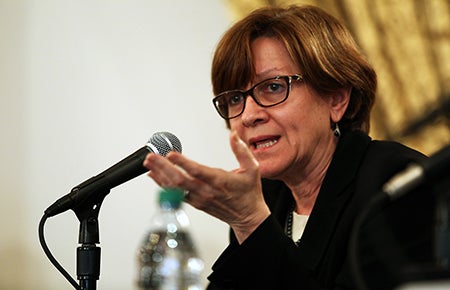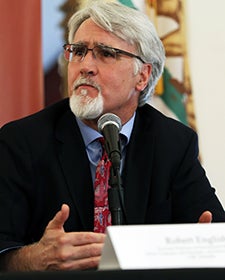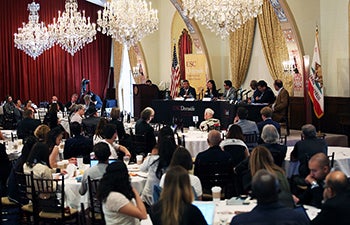
Conference examines President Trump’s first 100 days in office: Part 2
President Donald Trump’s early foreign policy record came under the scrutiny of leading experts from across the political spectrum during the “First 100 Days Conference,” hosted by USC Dornsife’s Department of Political Science and Jesse M. Unruh Institute of Politics. In this, the second of two articles covering the April 26 conference, we look at “Trump in the World.”
USC Dornsife’s Laurie Brand, Robert Grandford Wright Professor and professor of international relations and Middle East studies and director of Middle East Studies, and Robert English, associate professor of international relations, Slavic languages and literature, and environmental studies, were joined on this panel by John Emerson, former United States ambassador to Germany; Joel Pollak, senior editor-at-large and in-house counsel at Breitbart News, and Todd Purdum, senior writer at Politico and political correspondent at Vanity Fair.

Laurie Brand makes a point during the discussion.
Christina Bellantoni, assistant managing editor at the Los Angeles Times, moderated.
Positives and negatives
First, Bellantoni asked panelists to grade Trump, citing examples.
After what critics widely viewed as a disastrous diplomatic start, Emerson said, Trump is beginning to build good personal relationships with world leaders.
However, Emerson criticized Trump’s “complete lack of understanding of the power and the necessity of diplomacy,” pointing to his heavy budget cuts to the State Department and Agency for International Development.
Although Emerson agreed with Trump’s action in Syria and the “terrific appointments” of Secretary of Defense James Mattis and National Security Adviser H. R. McMaster, he awarded Trump a C- to D- for lack of a comprehensive strategy.
“In his first three months, Trump has done a very good job of squandering literally the most important asset that any U.S. president has when it comes to foreign policy — presidential credibility,” Emerson said. “When you start Tweeting about and promoting far out conspiracy theories, or unproven, or flat out false statements and accusations, you undermine the credibility of your office.”

Robert English speaks at the conference.
Purdum gave Trump an incomplete grade, “Or an I for inchoate because … it’s hard to see what’s consistent about [policy] from day-to-day,” adding that the president’s unwillingness to untangle his complicated web of global conflicts of interest has also undermined his credibility.
Purdum expressed relief at Trump’s shift on foreign campaign policy since taking office.
“I think, as people who live in a dangerous world, we can all be grateful that he’s adopted a more conventional foreign policy overall,” he said.
English declined to grade the president, but said those wishing to see Trump return to traditional foreign policy are heartened by the departure of General Michael Flynn and the apparently lessened influence of Steve Bannon.
However, Purdum found State Department and general diplomacy budget cuts alarming, and criticized Tillerson’s “seeming lack of interest in defending his own, not just bureaucratic turf, but mission.” Citing Mattis, Purdum said advocating soft power “doesn’t make you soft, it makes you smart.”
Shifting perspectives
Pollak awarded Trump an A for foreign policy and defended his unpredictability as “the only way to claw back some of that strategic advantage that was lost over the last decade.”
“Trump … defies expectations,” Pollak said. “You can understand his behavior by understanding almost everything he does is a negotiating process. He’s done everything a good negotiator would do to obtain better results, more leverage, and ultimately the outcomes he wants to achieve.”
Conservative criticism, Pollak said, stems from perceptions that Trump is falling back into patterns of previous administrations by engaging in the Middle East and prioritizing an Israeli-Palestinian peace accord.
Brand praised Trump’s non-implementation of two campaign promises he pledged to carry out on his first day in office: moving the U.S. embassy from Tel Aviv to Jerusalem and tearing up the nuclear deal with Iran.
However, she criticized Trump for congratulating President Recep Tayyip ErdoÄŸan of Turkey on winning his country’s recent “democracy-gutting” referendum.

The day-long conference, held at Town and Gown on USC’s University Park campus, drew students, faculty, staff and members of the public.
“While it’s one thing for an administration to decide it’s not going to use human rights advocacy as one of its positions, it’s another thing to actively come out in support of someone who is clearly turning Turkey into a police state,” she said.
Brand also castigated Trump for his executive order banning federal money from going to international groups that perform, or even provide information about, abortion.
“We need to think about the number of women who will die from illegal or unsafe abortions as a result of the direct impact [of this executive order],” she said.
Pollak compared Trump’s strategy to that of former President Ronald Reagan — we win, they lose.
Citing Iraq, Emerson stressed that the problem with that strategy is what happens after we win. Broader thinking about ultimate consequences was needed.
He said he was concerned that unwanted red lines might be inadvertently established “through bluster, tweets and comments.”
“Then if they cross a red line you’re stuck … How do you respond? … You don’t want to go so far with the baiting that you end up eliciting … a first strike attack.”
Leadership in question
Pollak argued that it shows “great American leadership in preparing to pull out of the Paris [Agreement] and to end this dalliance with pseudoscience that masquerades as climate change.”
Emerson said that was a hugely problematic and risky approach.
“I used to say in Germany, if you don’t like the flow of refugees today, just imagine the flow of refugees when we have climate refugees and people moving because previously arable land has become arid. Wait until we start seeing wars over water, massive flooding and sea levels rise,” said Emerson, reminding the panel that climate change is viewed by the military as a significant national security issue.
English questioned what it means for America if it backs out of treaties and no longer leads on climate change. “Does China step in and do we also lose economically? I don’t know, but I’m sad to see American leadership … vanishing,” he said. As for earlier expectations of warmer relations with Russia, English emphasized that the White House faces months of sensitive investigations before it will be able to undertake any bold moves vis a vis the Kremlin.
“Never before, in my memory, has Russian policy been so intimately tied with … American domestic politics,” English said. “If these investigations produce a smoking gun, then everything changes.”